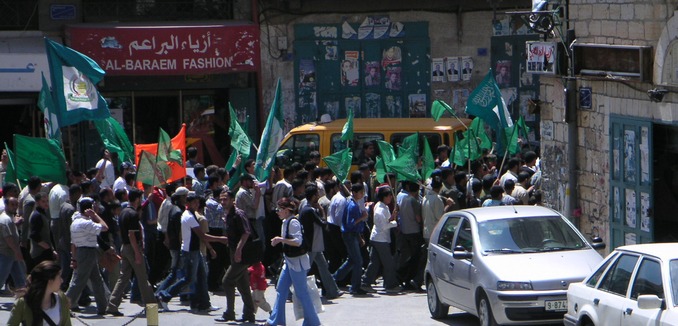A poll released today by the Palestinian Center for Policy and Survey Research (PSR) reveals that an overwhelming majority of Palestinians believe that Hamas defeated Israel in Operation Protective Edge, resulting in a surge of popularity.
PSR observes that, “as we saw in previous instances during and immediately after Israeli wars with Hamas, findings show a spike in the popularity of Hamas and its leaders.” PSR adds:
It is worth noting that the size of the change in favor of Hamas is unprecedented since 2006. Indeed, if presidential elections were to take place today, Ismail Haniyeh would easily win over Abbas and Hamas would win the largest percentage of the popular vote in parliamentary elections. … Indeed, an overwhelming majority of West Bankers wants to transfer “Hamas’ way” to the West Bank and rejects the demand to disarm the Islamist group or to disband the other Gazan armed groups. Findings also indicate that the public see Iran, Turkey, and Qatar as the most instrumental in supporting Hamas and helping Gazans remain steadfast against the Israeli attacks. By contrast, Egypt’s role is seen as week and unhelpful. Indeed, a majority believes that Egypt played a negative role in the ceasefire negotiations.
The Times of Israel provides some numbers and related context:
That change is clear in the approval ratings given to Hamas and its leaders compared to those given to the Palestinian Authority. Hamas received 88% approval for its performance during the war, and its political chief Khaled Mashaal won 78% approval. The Palestinian Authority came in significantly lower, with just 36% approval; its leaders, President Mahmoud Abbas and Prime Minister Rami Hamdallah, received 39% and 35%, respectively. …
Paradoxically, and worryingly for Israel, Hamas received higher support in the PA-controlled West Bank than it did in Gaza. The poll found that if elections were held today, former Hamas prime minister Ismail Haniyeh would easily defeat Abbas with 61% of the popular vote versus 32%. Sixty-six percent of respondents in the West Bank said they supported Haniyeh, compared to 53% in the Gaza Strip. In the West Bank, Abbas received just 25% approval, as opposed to 43% in Gaza. Overall support for the Palestinian Authority president plummeted 11% points in two months, from 50% in June to 39% in August, the poll found
The Times also notes that this is the first time that Hamas leader Ismail Haniyeh outpolled convicted terrorist Marwan Barghouti, with the former favored by 49% to 45% for the presidency of the Palestinian Authority.
On Sunday, former commander of British forces in Afghanistan, Col. Richard Kemp explained, “Hamas has been defeated … in as much as they have had to accept the terms of a ceasefire, which had been offered to them right at the beginning of the conflict.”
A poll in May found that Marwan Barghouti was the favorite among Palestinians to succeed Palestinian Authority President Mahmoud Abbas. Also in May, Palestinian Media Watch (PMW) reported that a video promoted on the Fatah Facebook page celebrated the violence perpetrated by the party’s Al Aqsa Martyr’s Brigades during the second intifada.
Associate Editor Benjamin Kerstein explained in Hammered: The Palestinian Peace Paradox, published in the March 2014 issue of The Tower Magazine, why even a peace deal with the Palestinian Authority isn’t necessarily reassuring:
This does not fill me—nor, I think, most Israelis—with a great deal of confidence. Even if a future Palestinian state does not fall to Hamas, such an agreement would still leave Israeli security dependent on the good will of Fatah, the party that refused peace in 2000 and then embarked on the terrorist war known as the second intifada, which killed hundreds of Israelis and did substantial damage to Israel’s economy. Given all this, most of us have come to think that there is a strong possibility that an Israeli withdrawal from the West Bank would lead not to less but more violence. Indeed, it is conceivable that it could lead to a war worse than the second intifada.
[Photo: Soman / WikiCommons ]




